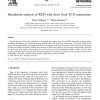Free Online Productivity Tools
i2Speak
i2Symbol
i2OCR
iTex2Img
iWeb2Print
iWeb2Shot
i2Type
iPdf2Split
iPdf2Merge
i2Bopomofo
i2Arabic
i2Style
i2Image
i2PDF
iLatex2Rtf
Sci2ools
103
click to vote
CN
2004
2004
Simulation analysis of RED with short lived TCP connections
Several objectives have been identified in developing the random early drop (RED): decreasing queueing delay, increasing throughput, and increasing fairness between short and long lived connections. It has been believed that indeed the drop probability of a packet in RED does not depend on the size of the file to which it belongs. In this paper we study the fairness properties of RED where fairness is taken with respect to the size of the transferred file. We focus on short lived TCP sessions. Our findings are that (i) in terms of loss probabilities, RED is unfair: it favors short sessions, (ii) RED is fairer in terms of the average throughput of a session (as a function of its size) than in terms of loss probabilities. We study various loading regimes, with various versions of RED.
Related Content
| Added | 16 Dec 2010 |
| Updated | 16 Dec 2010 |
| Type | Journal |
| Year | 2004 |
| Where | CN |
| Authors | Eitan Altman, Tania Jiménez |
Comments (0)

